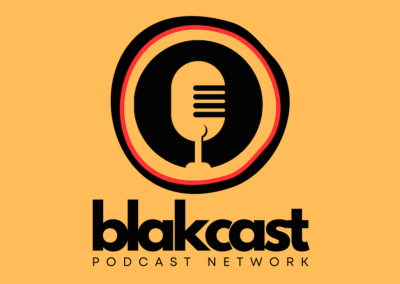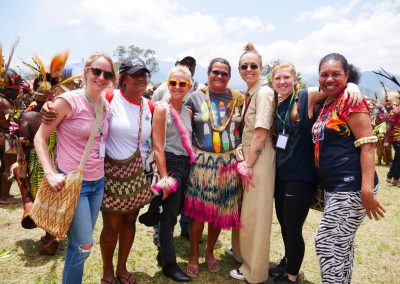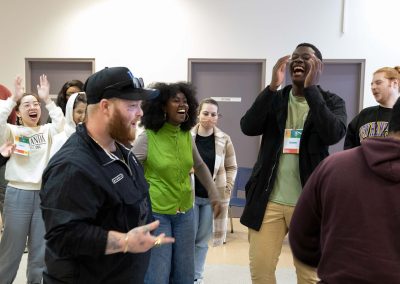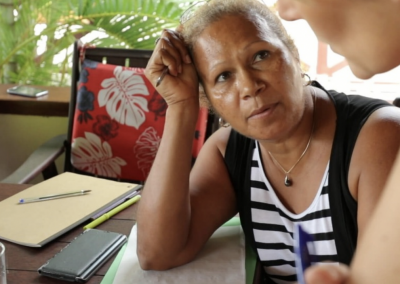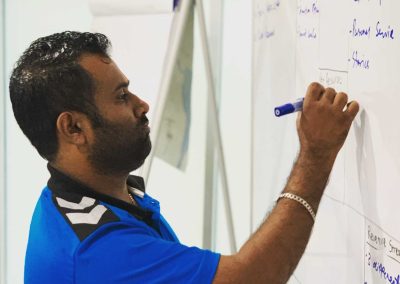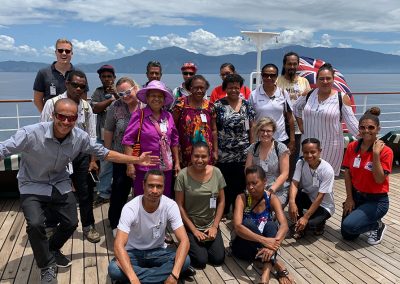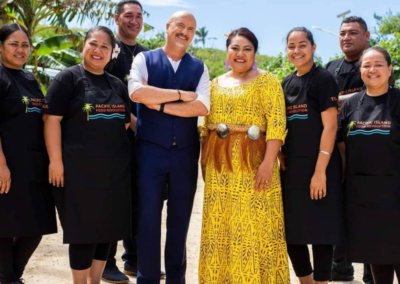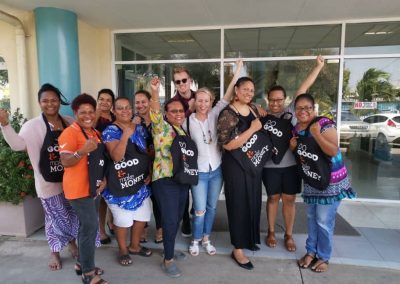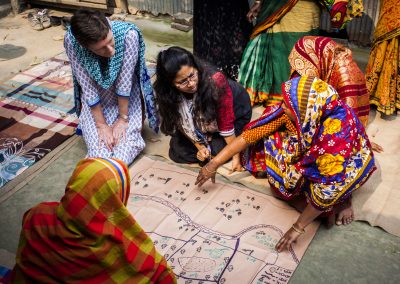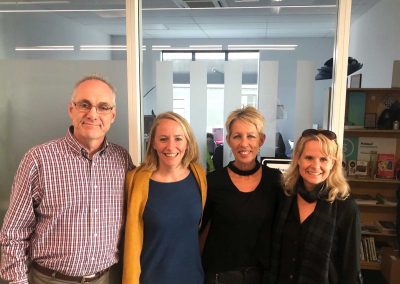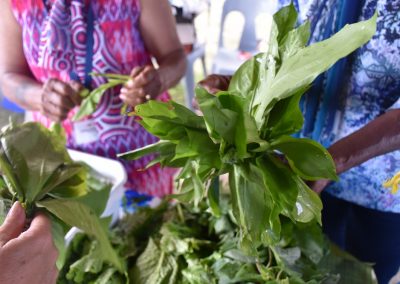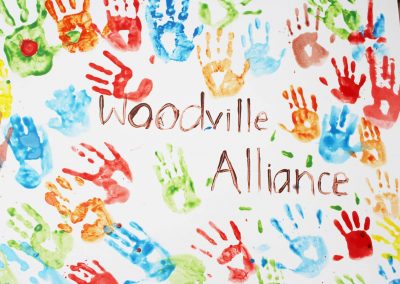read our
case studies
Social Enterprise Strategy: Amplifying First Nations voices through Australia’s first Indigenous podcast network
How clear strategy for social enterprise podcast Black Magic Woman helped founder Mundanara launch Australia's first Indigenous podcast network. VIEW FULL CASE STUDY
Transforming market opportunities for bilum weavers
How TDi collaborated with partners and creatives to transform market opportunities for women bilum weavers in PNG, boosting international demand and access, supporting the creative and cultural industry, and increasing economic equality for women, their families, and their communities. VIEW FULL CASE STUDY
Strategic Planning Empowers NFPs for Sustainable Impact: YLab Case Study
Discover how YLab, a youth co-design and consulting social enterprise, partnered with TDi to redefine their mission, goals, and business model. Learn how collaborative and responsive strategies helped YLab achieve clarity, maturity, and sustainable social impact. VIEW FULL CASE STUDY
Building the Local Capability of Women Business Coaches in PNG to Deliver Sustainable and Inclusive Economic Growth
In 2020, at the onset of the COVID-19 pandemic, we had the opportunity to prototype a new program focusing on localising development: building the capability of four Local Business Coaches in PNG, growing a localised and sustainable model of support for women MSMEs. VIEW FULL CASE STUDY
A Scalable and Localised Model of Micro and Small Business Support for Women Entrepreneurs in PNG
How TDi delivered a coaching program for women entrepreneurs on behalf of the Australian Government, and in partnership with Abt Associates, the PNG Women’s Business Resource Centre, CIPE, and Resources Reimagined. VIEW FULL CASE STUDY
Strengthening business ecosystems: Curriculum review and business model development for Fiji entrepreneurs
Engaged by DFAT, we worked with Market Development Facility to revamp their incubator program by refining curriculum, training trainers, and developing a sustainable business model, ultimately fostering local ownership and embedding robust business support services in the regional ecosystem. VIEW FULL CASE STUDY
YuMi Tourism Partners: A shared value project
There’s no ‘one mould’ for the work that we do with government and corporate partners to create shared value. YuMi started as an idea between Carnival Australia, TDi and Department of Foreign Affairs and Trade (DFAT). Carnival described their challenge of bringing local, meaningful, cultural experiences to their customers at ports around the Pacific. TDi, from experience working in the Pacific, noticed the continual challenge for local Indigenous entrepreneurs being locked out of the market by big international corporations that they were unable to meet or access contracting regulations. DFAT were looking to 'prove out a new model’ for delivering Aid and Development. They wanted to develop sustainable Indigenous businesses that could become a successful enterprise in their own right. These three challenges formed the basis of the question ‘what needs to exist in the market to create a different outcome for all parties?’ VIEW FULL CASE STUDY
Cultivating a sustainable business model for food systems initiative
How TDi cultivated a sustainable business model for a food systems initiative, inspiring Pacific Islanders to return to local cuisine to benefit health. VIEW FULL CASE STUDY
DESIGN & STRATEGY: Building social enterprise capability and Business Resilience
Over a period of a couple of months, TDi worked with the City of Darebin on two discrete programs focused on supporting the sustainability of small-to-medium businesses. VIEW FULL CASE STUDY
BUSINESS ACCELERATOR PARTNERSHIPS: Indigenous Business Australia
In 2018 Indigenous Business Australia (IBA) approached TDi looking for a solution to support Indigenous entrepreneurs build their business acumen and name their social impact. This was in line with IBA’s mission to advance the commercial and economic interests of Aboriginal and Torres Strait Islanders. Together with IBA, we have designed – and continue to iterate – a unique program for Indigenous entrepreneurs. VIEW FULL CASE STUDY
BUSINESS ACCELERATOR PARTNERSHIPS: Guria – a womens business growth accelerator
The Difference Incubator is partnering with the Women’s Business Resource Centre (WBRC) in Port Moresby to run a growth accelerator program called Guria. Guria means ‘earthquake’ or ‘shake up’, representing the change that twelve magnificent entrepreneurs have dared to make. Over the program, each entrepreneur aims to double their revenue and double their profit, without doubling their workload. This first iteration of the program is led by The Difference Incubator alongside the WBRC team, with the intent to shift ownership of the program to WBRC over the next few years. This also allows WBRC to tailor the training to assist all of their members, creating a broader impact across Papua New Guinea. VIEW FULL CASE STUDY
CONNECTION TO INDIGENOUS & PACIFIC ENTREPRENEURS: Laikim Sister
In April 2019, TDi, Abt Associates and the Australian High Commission to Papua New Guinea (PNG) began to explore how a business exchange between PNG and Australian Indigenous women could be designed to further people-to-people links between the two countries, building on the thousand year history of trade and knowledge sharing. VIEW FULL CASE STUDY
CBM Australia: growth strategy and business sustainability
CBM’s vision is an inclusive world where all people with disabilities enjoy their rights and achieve their potential. They are a not-for-profit devoted to breaking the cycle of disability and poverty with people with disabilities in the poorest communities. From this successful foundation, CBM Australia approached TDi to support it in developing a strategy that would allow it to strengthen the sustainability of its advisory work, prepare for growth within the CBM federation and respond to immediate opportunities in Australia and abroad. VIEW FULL CASE STUDY
Accelerators at TDi
Through our Two Feet accelerator program, we work with dozens of entrepreneurs every year to ensure they have sustainable business models. One such social enterprise from our 2018 cohort, is Big Little Brush. They sell bamboo toothbrushes in an effort to minimize plastic waste, and 50% of their profits goes to Red Dust, a health provider for remote Indigenous Communities. Founder, Joel Hanna said of his time in Two Feet: “There’s two key moments that stand out as being influenced by our time in the program. Firstly, our ability to identify and test many assumptions that we’d made about our business model. Secondly, the Business Model Canvas helped us to reassess our growth strategy. Originally, we intended to grow by increasing our product lines, however, using the Business Model Canvas allowed us to both identify and articulate alternative, leaner growth opportunities which we ultimately ended up following. Since the program, I’m pleased to say we’ve grown, both in revenue and number of customers. We’ve also developed a better relationship with our partner Red Dust. VIEW FULL CASE STUDY
Hepburn Wind: diversifying revenue streams for a co-operative
In 2018, energy co-operative, Hepburn Wind, approached TDi to help them assess options for diversifying their revenue streams. The co-operative’s management team had skilfully navigated the business through many years of uncertain government policy. When we met them, record energy prices and their skilled management had meant that they finally had some financial runway to rethink their longer-term strategy. VIEW FULL CASE STUDY
Not For Profit Coaching
In July 2019, TDi received an email from a medium-sized Not For Profit that works with children at risk and is a respected and successful sector leader. It was an invitation to submit a proposal in response to a standard RFP detailing a need for research into new customer segments for a social enterprise. The client had allocated about $50K for this research, reporting including some customer testing. TDi was only able to have the usual stilted conversations that often occur during EOI’s and RFP’s and won the contract. VIEW FULL CASE STUDY
Wicking Trust/Equity Trustees: validating social enterprise business model
The Wicking Trust is one of many philanthropic trusts Equity Trustees manages in perpetuity, bringing leadership and vision to the yearly fulfilment of the wishes of the Trust’s founders. As often occurs, this philanthropic trust not being an expert in social enterprise needed help to ensure that a grant application would be a wise use of its funds. A promising new social enterprise had submitted a grant application that delivered on the core aspirations of the Wicking Trust. It is ambitious with a powerful business model and was requesting a substantial grant. Equity Trustees approached TDi to assess this enterprise and validate its business model, giving advice on the risk to The Wicking Trust. VIEW FULL CASE STUDY
Essence of Fiji: a case for impact investment
In 2018, the Founder of Essence of Fiji, Debra Sadranu approached TDi to take her business to the next level. Essence of Fiji is a Fijian natural-skin care business, established to benefit Fijian women and villages through employment and village-based seagrape harvesting. When we first met Debra she had launched her new skincare range in Fiji and wanted to expand into international markets and consolidate her local operations, but she lacked the capital to go further. She knew she needed to improve her bottom line and bring on new investment partners, but she didn’t know how to do it. VIEW FULL CASE STUDY
COVID-19 Economic Recovery Support
With the emergence of COVID-19, small-to-medium enterprises (SMEs) in Papua New Guinea (PNG) have experienced protracted upheaval and uncertainty. Many businesses owners have been and continue to face substantial declines in revenue. This, combined with ongoing uncertainty, is having a negative impact on their mental health and ability to keep operating. VIEW FULL CASE STUDY
CONNECTION TO INDIGENOUS & PACIFIC ENTREPRENEURS: YuMi Tourism Partners Program, Alotau
How one cohort built resilience for economic recovery. VIEW FULL CASE STUDY
Case Study: Woodville Alliance
Opportunity Woodville Alliance are a mid-sized not-for-profit based in vulnerable communities in south-west Sydney, in the areas of mental health, disability services, and early childhood learning. TDi were brought in after the senior management team at Woodville Alliance realised that their initiatives and impact had room to grow, and that they could use this as an opportunity to diversify the organisation’s revenue. Woodville were aware that as an organisation they had traditionally been reactive to funding opportunities, rather than being proactive and predicting what the community ... VIEW FULL CASE STUDY
